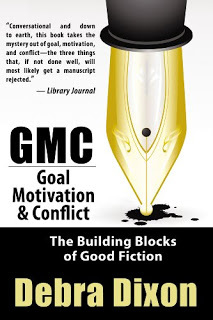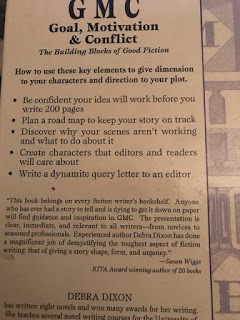The Importance of Goal, Motivation & Conflict.
The long days of summer make it hard to stay at the keyboard, but for many of us, they're also a time when we have more time to write. It's with this in mind that I'm doing a re-post.
The reason I'm reposting this particular post is because last week I attended a webinar hosted by FHLCW that featured Shana Asaro. Shana spoke for over an hour and answered tons of questions about writing for Love Inspired and Love Inspired Suspense.
During much of her presentation, she focused on the importance of GMC - the goal, motivation, and conflict needed for a successful submission.I found it particularly fascinating when she mentioned that several years ago, the Love Inspired editors read and studied this book together. That was enough motivation to get me to pull my copy off the shelf and dust off the cobwebs. I figured we could all use a refresher, so here is my original post on the topic.
Before I begin, a caveat - I can't say GMC by Deb Dixon is one of my favorite craft books (for reasons which I will explain), but there's no doubt it's an important and beneficial one.

You see in many ways I could be that cautionary tale veteran writers use to terrify newbies. Once upon a time, a long, long time ago, when I first began to write, I had no idea that there was such a thing as structure or that stories followed any prescribed formula.
I should amend that comment. I was not consciously aware of it. But because I was an avid reader, and had been for my entire life, I had a somewhat intuitive sense of story structure even if I didn't know that's what it was.

So, picture me happily writing away without a care in the real world, lost in my own wonderful story world.
But then I took a break from writing for a while - children, work, grad school, there just weren't enough hours in the day to make it all work, and writing took the back seat.
Cue the violin music.

No, seriously, the reason I'm explaining that is because I so very clearly remember coming back from my self-imposed writing exile to attend a writer's conference. And I remember being confused because of all the buzzwords I was hearing - and the buzzword that was on everyone's lips was GMC.
GMC. I had no idea what they were talking about. It was like everyone else was speaking a different language.
Finally, some kind soul clued me in to Debra Dixon's book (which had been published while I was off on writing hiatus).
I read it. I saw it's value (which it clearly had since everyone was talking about it!), and I ignored it.
I didn't want to write conflict.
I liked happy stories.
I didn't want to make them be mad at each other.
Are you laughing at me yet?
I learned my lesson, and that got me book contracts. So here's hoping it will help you too.
I'm going to use a photo of the back cover, because I think this shows why the book is so important.

I could try to give examples, but that would sort of be plagiarism, so I'll just recommend you get yourself a copy if you don't have one to dig out of the cobwebs.
GMC is apparently also a really popular topic here on Seekerville.
If you're interested in looking more into it. check out some of these posts:
Mindy's Engaging Openings
Missy had one in the Archives - Battling Through Your Manuscript...Once Scene at a Time
(Note: Missy really gave a detailed explanation of how she uses a GMC chart.)
Then there are all these GMC posts in the Seekerville archives!
So tell me, are you a GMC chart maker? How do you handle planning the goals motivations and conflict for your characters?



